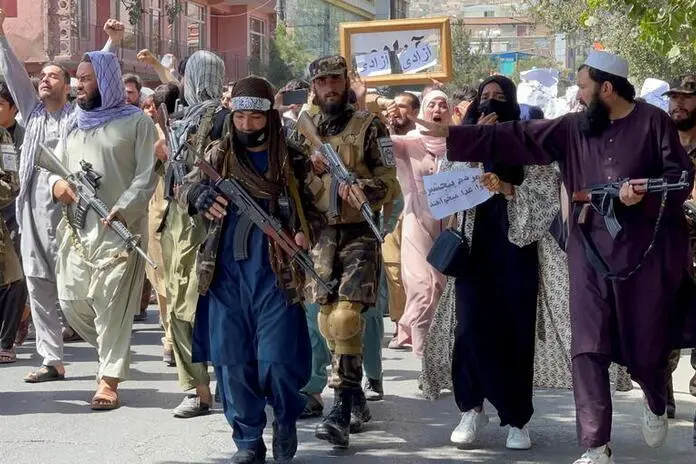PHOTO
It is now clear that the 20-year effort by the US and its European allies to turn Afghanistan into a stable, democratic country has failed. It is important to remember, however, that the invasion was the brainchild of neoconservatives, who were the main driving force behind the twin invasions of Afghanistan in 2001 and Iraq in 2003. Many others were opposed at the time.
America’s humiliating withdrawal from Afghanistan should put an end to those grand neocon designs, which failed at almost every turn. That may also be true for those US plans for Afghanistan’s future, which were put together on the assumption that Ashraf Ghani’s government was stable and would survive the troop withdrawal. US planners now need to come up with updated plans for America’s role in Afghanistan and discuss them with allies and partners, whose own plans were thrown asunder by last month’s turn of events.
To write off Afghanistan is not an option, as the instability of the country would spill over into the region and create problems that may be more difficult to tackle in the future.
In a sign of the limited options articulated to deal with the new crisis, the London-based Daily Telegraph newspaper reported that the UK government is discussing a proposal to blacklist Afghanistan and allow the London authorities to jail people for up to 10 years if they are proven to have visited the outlawed territory. This is obviously not a solution.
Besides Afghanistan itself, the Western alliance is the most notable casualty of the Afghanistan debacle. Reports from Brussels hint at a real disappointment among European allies in the way the US and NATO exits were managed. The 27 EU member countries and its institutions are confronting the reality of near-total reliance on US military plans and grasping for new policy options. Despite the fact that 21 EU member states are also members of NATO, they were not able to adjust the withdrawal plans to allow Kabul airport to remain open for a few more days or weeks to handle evacuations and receive urgent humanitarian assistance.
Josep Borrell, the EU’s top diplomat, last week wrote an op-ed in The New York Times calling for serious discussions about the EU’s over-reliance on the US and the need for better coordination and burden-sharing.
Roland Freudenstein, policy director of the Wilfried Martens Centre for European Studies, a think tank associated with the center-right European People’s Party, was quoted as saying that much of Europe “is indeed in pretty deep depression now.” He added that the widespread gloom reflected the dashed hopes that, despite corruption in the Western-backed Afghan government and the weakness of the Afghan security forces, somehow the mission could succeed. “There were people who didn’t want to see the writing on the wall. There were people who were deluding themselves,” he said.
The joint meetings of EU defense ministers and foreign ministers held in Brussels last week took a decision to set benchmarks for engaging with the Taliban, but made no public announcement about dealing with the security fallout from the troop withdrawal from Afghanistan.
A lengthy written statement issued by European Council President Charles Michel bemoaned Europe’s inability to change matters for the better in Afghanistan and asked: “As a global economic and democratic power, can Europe be content with a situation where it is unable to ensure unassisted the safety and evacuation of its diplomats, its citizens and those who have helped them and are therefore under threat?” He added: “Europe must rapidly make choices connected to its strategic interests.”
While these are important issues that need to be sorted out between the US and its allies and partners, there are more urgent issues at hand. There is a clear need for Afghans and their friends, including the US, NATO and the country’s neighbors, to develop new policies and action plans to deal with the crisis, starting with assessment of the risks and threats emanating from the vacuum left by the Western troop withdrawal and subsequent collapse of the government. Those risks and threats include civil war, terrorists regrouping, worsening COVID-19 conditions, and a severe economic crisis after the International Monetary Fund and World Bank halted aid and the US froze Afghanistan’s reserves and stopped the shipment of currency to the country.
UN Security Council Resolution 2593, adopted on Aug. 30, is a step in the right direction, despite China and Russia’s abstentions. Now is the time to ensure its proper and speedy implementation. One of the most important issues should be to establish a mechanism between willing friends of Afghanistan for regular coordination and consultation, and to send the Afghan people a message of reassurance and solidarity. The coordination of humanitarian assistance is also urgent and could be carried out by the group.
It is probably too early for most countries to take a clear political position on the situation, which may complicate their work with some Afghan factions, but a call should go out to all Afghan parties to engage in negotiations toward a political solution. It should be emphasized by the group that the international community is ready to engage with all Afghan factions to facilitate the delivery of aid, but also to prevent the country from once again becoming a haven for terrorists.
The US, UK and France led the process of adopting Resolution 2593, which makes it appropriate for them to lead the process of implementing it, with UN help.
- Dr. Abdel Aziz Aluwaisheg is the GCC Assistant Secretary-General for Political Affairs & Negotiation, and a columnist for Arab News. The views expressed in this piece are personal and do not necessarily represent GCC views. Twitter: @abuhamad1
Copyright: Arab News © 2021 All rights reserved. Provided by SyndiGate Media Inc. (Syndigate.info).





















